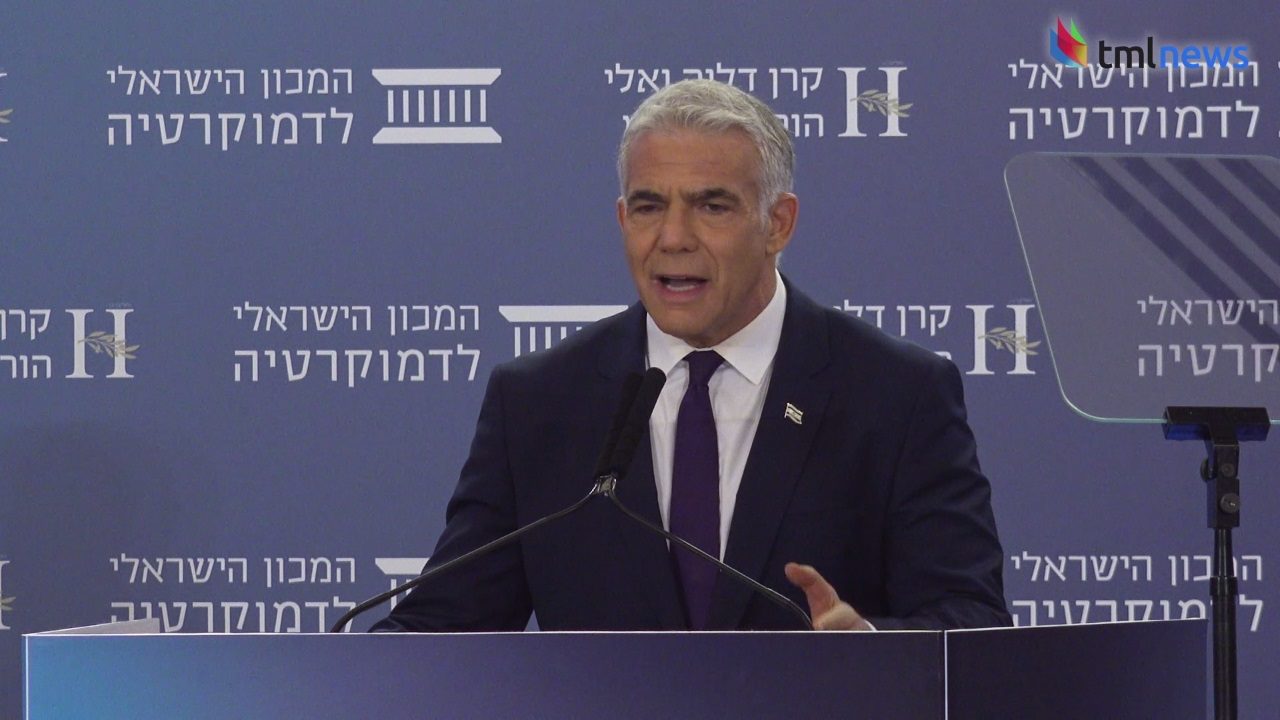Lapid: Strongest Person in Opposition Isn’t Netanyahu, It’s Ben-Gvir
Incoming interim Israeli prime minister kicks off election campaign; Arab workforce participation on top of agenda at socioeconomic conference in Jerusalem
Israeli Foreign Minister and incoming Interim Prime Minister Yair Lapid kicked off his election campaign on Wednesday by attacking Opposition Leader Binyamin Netanyahu and Itamar Ben-Gvir, who heads the far-right Otzma Yehudit party, part of the Religious Zionism list in the current Knesset.
Speaking at the Israel Democracy Institute’s Eli Hurvitz Conference on Economy and Society, Lapid lambasted Netanyahu for allying with extremists in a bid to remain in power.
“Today the strongest person in the opposition is not Bibi Netanyahu, it’s Itamar Ben-Gvir,” Lapid told attendees. “Ben-Gvir’s message is simple and violent: he says no to a democratic state, no to liberal values, no to moderation, and no to the rule of law. Only racial nationalism.
“This message has come at a dangerous moment because Netanyahu knows that if Israel remains a liberal democracy, then he won’t be able to cancel his trial so he’s completely dependent on Ben-Gvir,” Lapid said.
He also accused the opposition of establishing a “fake news machine” funded by foreign oligarchs. Lapid decried the opposition’s relentless attacks on Prime Minister Naftali Bennett, calling him a “good man, a good Israeli, a good prime minister. Look at how much poison they threw at him.”
Lapid spoke hours before lawmakers voted to dissolve parliament, sending Israel to its fifth round of elections in less than four years.
The foreign minister and Bennett put an end to Netanyahu’s long reign last year when they formed a broad coalition made up of right-wing, left-wing, and Arab parties. Nevertheless, the alliance came undone in recent months as members left and it lost its razor-thin parliamentary majority.
Men falling behind in Arab workforce participation
Aside from political wrangling, officials and researchers at the Eli Hurvitz Conference also discussed several key socioeconomic issues facing Israeli society, including the labor market in the Arab sector, which was hit hard by the COVID-19 pandemic. Last fall, the Israeli government approved a $10 billion plan to help develop the sector socially and economically.
According to Hassan Tawafra, director of the Ministry of Social Equality’s Authority for Economic Development of Arab Society, Arab women’s workforce participation has increased significantly in recent years, moving from nearly 20% to over 40% over the past decade.
Interestingly, Arab men are the ones currently falling behind.
“In the past decade, Arab women’s employment rate doubled but at the same time, the employment rate for Arab men has dropped dramatically,” Tawafra told The Media Line. “We’ve dropped from 72% to 60% and this is from before the pandemic. There are many reasons for this; one of them is that higher education and graduation rates for men have gone down.”
The issues are systemic, according to one researcher.
“The Arab sector is still not receiving what it needs in terms of financial allocations due to many years of discrimination,” Ben Fargeon, a researcher at the Israel Democracy Institute’s Arab Society in Israel program, told The Media Line. “This discrimination has also led to Arab municipalities being very weak and even when they manage to receive money, they might not be able to use it because they’re understaffed or don’t know how to issue calls for proposals.”
Dozens of projects aimed at boosting education and employment in the Arab community have been launched in the past year alone thanks to funding received under the current coalition government, Tawafra said.
For instance, the ministry has established a gap-year program that aims to provide new high school graduates with tools and training to help them better integrate into the workforce.
Although Israel’s ongoing political turmoil could soon bring such initiatives to a standstill, Tawafra is optimistic.
“I truly hope that in the coming year there will be a state-approved budget and a government so that we can continue working, but this year we’re not expecting any delays,” he said.


